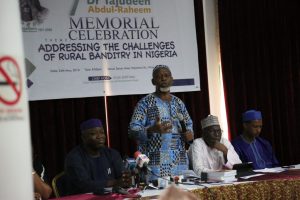
Taju’s ever present slogan
Generally, memorialisation is a delicate affair. Who is being remembered, for what, by whom, when and where always has a tendency to trigger all sorts of mood. It could be even more so when it is the late Dr Tajudeen Abdul-raheem and when the theme is “Democracy in Africa: Trends, Challenges and Lessons”. With a persona that still cannot be declared fully accounted for without risking closure, Tajudeen’s memorial could quickly develop into a sentimental moment along the line. For a brief moment yesterday at this year’s, someone couldn’t help it. Taju, as everyone calls him even in death, has retained such a powerful impact on the psyche of all who encountered him while alive. “Unfortunately”, those who encountered him alive were much. It could not be less for someone from Ogbomosho in South-Western Nigeria who grew up in Funtua in Northern Nigeria, attended Bayero University, Kano, obtained a First Class degree in Political Science, went to Oxford University as a Rhodes Scholar, straddled the UK intellectual and activist space as well as those spaces in Africa, died in Kenya and was buried in Funtua.
It was thus understandable when Amina Salihu started out her Master of Ceremony task by talking about how Taju remains the one whom many friends, families, comrades and sundry players continue to remember. Even Kole Shettima who wanted to stay away from saying anything about who Taju was ended up re-inscripting Taju by referring to him as “the African president we never had”. He meant that wherever Taju was when he was alive, he was the African on a world scale. In Kole’s view, it was not coincidental that Taju died early morning of May 25th, 2009. May 25th every year is Africa Day.
Dr Limota Giwa, the Executive Director of the International Women Communication Centre , (IWCC) in Nigeria, the first person called to pay tribute to Taju imagined Taju engaging and being engaged by the family, his two children, relations, the girls secondary school he built in Funtua as a practical side of his gender activism, his numerous friends across the world, the gender movement, some African leaders Taju worked with and the MDGs/SDGs. She imagines “friends and colleagues in the Diaspora: London, Uganda, Kenya, USA, South Africa, Rwanda and everywhere I go, asking me where is Tajudeen and when is he going to come back to us”. The lesson here and the hard reality, she said, is that Taju isn’t going to come back. Praying for him and marking his death as was being done yesterday is what Limota could see.

In-gate of Bayero University, Kano from where Taju graduated in 1982
Mallam Aliyu Shehu, a close friend of Taju delved into how Taju ended up with a First Class in Political Science from Bayero University in those days and ruminated over the offer of Rhodes Scholar opening in Oxford. Cecil Rhodes was one of the most key players in colonial warfare against Africa. And here was a scholarship in his name, the equivalent of a Nobel Prize in scholarship as someone described it in the hall. How could Taju, the emerging Pan-Africanist who studied under the late Dr Bala Muhammed, (the equally late Political Adviser to Abubakar Rimi) take what amounted to imperialism’s scholarship? Somehow, the decision was made and Taju went to Oxford.
Illiyasu Gadu who was Taju’s friend and school mate at Bayero University added the bit about the completeness of Taju in relation to Africa. As a Nigerian, he was a West African. By marriage, he was a North African. Through political involvement in the struggle for the liberation of the last batch of Southern African countries, he became one. Of course, he worked and lived in East Africa. So, Gadu says that “by the time he passed on, he was really African”.
There was what one could call the ultimate tribute to Taju by Professor Okello Oculi. It was a simulation of the African Union summit by students of Anglican Girls Grammar School, Abuja. The idea is that through role playing, talking Africa, reinforcing, mimicking, interrogating and disagreeing among themselves as OAU/AU leaders, they grow up in tune with an African canvass of reality rather than the ethnic, religious and insular pigeon holes that breed the conflict epidemic on the continent. And, by some luck, a truly African leader could emerge from among these Baby Excellencies. However, except former President Obasanjo, no Nigerian leader has seen any merit in this project yet in terms of support. Perhaps the mood would change if Nigerians watch the resounding applause for the girl that played Osinbajo of Nigeria and the uproar against her Zimbabwean counterpart. That’s Africa for you. But the simulation complemented the joke about Oculi and Taju. It goes like this: Nigeria lent Taju to Uganda while Uganda lent Oculi to Nigeria”.

Dr Chidi Odinkalu moderated the panel
It was time for Dr Chidi Odinkalu to assume duty as the moderator of the panel on “Democracy in Africa: Trends, Challenges and Lessons”. The list had been amended to Dayo Kusa, a former female journalist and an intellectual of Peace; Adagbo Onoja from Intervention Online and Prof Okello Oculi, the Executive Director of the Pan-African platform, Africa Vision 525. In bringing the panel and the audience to attention, Odinkalu remarked about his memory of Taju being one of an inspirer, that fellow that moves, that tempts you it is possible, with an incredible ability to laugh at the world, to speak the truth and move seamlessly between the lowest and the high and mighty of society. He thanked Prof Oculi for putting together the simulation, saying the idea of ‘satanic elections’ he heard from the show is his point of departure on the theme.
Dayo Kusa found that agreeable, linking that to the thesis of the gerontocratic spoliation of the democratic broth in Africa. She had a list showing how more than 20 African leaders today are over 70 years of age, who have taken the presidency to mean a chieftaincy, find it difficult to respect themselves and conduct horrible elections. She had the audience. Onoja, on his part, canvassed the idea of pursuit of quality right wing individuals for leadership on the ground that class, party, quality of progressive politics, local, and external contexts of democracy in Africa called for that.
Queried subsequently by panel moderator, Onoja defended the argument by saying that what the empire radius of the nationalism of the George Washingtons had done for the USA, the nation building dare of Lee Kuan Yew in Singapore, including bringing whole classes into being, the social engineering canvass of Deng Xiaoping in China against the Maoist trajectory and what Mandela did by opening negotiations for Independence at a time it would not have been accepted by ANC caucus showed that lack of idealist leaders is the more fundamental problem of democratisation in Africa. He said people like Nkrumah and Nyerere demonstrated the purchase of his argument in analysis of Africa. Prof Oculi cautioned against lumping together all African leaders as gerontocratic. He argues for looking at each in context, saying that some such as President Ellen Sirleaf of Liberia had undergone baptisms of fire to become what they now are in power terms. Being young, said Oculi, is not necessarily the point because that quality is only a potential “but that potential could be corrupted”. The issue is how leaders relate to the community, not the age.

Flashback to last year’s where Odia Ofeimun and others spoke on rural banditry in Nigeria
It had been a long day but issues concerning Taju can hardly be exhausted at one sitting. So, since his demise when he drove to death at 1: 45 am on May 25th, 2009 in Kenya, he has remained in the minds of too many. It would not be surprising if the 8th anniversary of Taju was thicker in Uganda and London than in Nigeria. There was that capacity for infectious presence, for a presence that was not threatening principally because everyone could see that Taju was incapable of having anything to do with cleverness. He already had the capacity to discursively drag his Other from wherever s/he stood to where he thought both ought to stand. Hence, the depth of fondness!
Noting the enthusiasm for the session to continue but against the background of timing, Dr Odinkalu brought the session to a close. But his language for that was adjournment, not closing. Taju is not a space that closes.




























